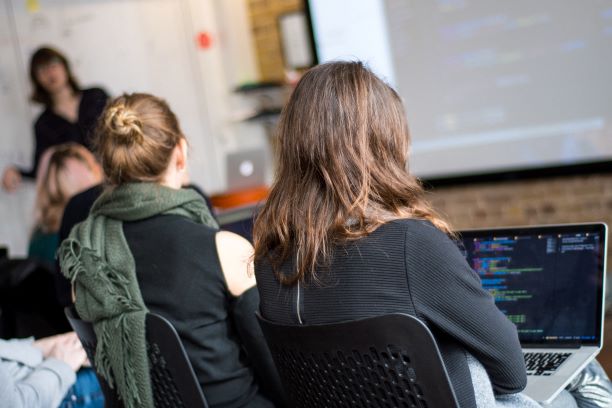WOMEN SOFTWARE DEVELOPERS FETCHING HIGHER SALARIES THAN MEN #NationalCodingWeek

But men earn more as career progresses
Leading Coding Bootcamp Makers has published the average starting salaries of their software engineering graduates since 2015.
The analysis, which includes over 450 alumni of Makers, showed that upon completion of their vocational training, software developers are fetching on average £32,500 a year.
This competitive pay packet is more than the median starting salary for UK university graduates, which, according to the recent High Fliers report, “The Graduate Market in 2019“, comes out at around £30,000 – and this is for the highest earning positions.
Makers’ analysis also suggests that women software developers earn more than their male counterparts after graduation.
So far in 2019, women software developers trained at Makers were offered an average starting salary of £34,000 per annum, 11% higher than four years ago, and 7% more than their male peers, who earn £32,000 per annum.
 According to the co-founder and CEO of Makers, Evgeny Shadchnev, creating a diverse digital workforce has become a core focus for many companies, leading to a greater demand – and higher salary package – for women software engineers:
According to the co-founder and CEO of Makers, Evgeny Shadchnev, creating a diverse digital workforce has become a core focus for many companies, leading to a greater demand – and higher salary package – for women software engineers:
“Coding skills are highly sought after across the UK, as businesses become more entwined in the global digital economy. Employers are also looking for a talent pool that is reflective of the diversity of the customers they aim to serve. Male coders may still dominate the workforce, but a premium has been placed on also attracting more women to join the world’s most exciting companies, and to play a role in shaping a more inclusive digital economy. This helps to explain why our female engineers have been entering the workforce with higher salaries than male graduates.”
He added: “We are proud to be in a position where we are successfully training the next generation of women developers and doing our part to close the gender divide in tech, but we need to do more to level the playing field and advance women to the top of the tech sector. However, we also believe that gender equality in pay should begin upon graduation and that people should be able to progress in their careers – and earn the same salary regardless of gender – if they are doing the same job.”
Makers has been at the forefront of vocational training for the digital economy. As the UK’s first and leading software coding bootcamp, it has trained over 1600 people since it opened its doors in 2014, and has been successful in attracting students from diverse backgrounds. 35% of its alumni are women, twice the national average.
More work needs to be done, however, to ensure that the gender pay gap does not widen as men and women continue along their career path.
Whilst women are beg their coding careers with higher salaries, male coders start to earn more once on the job. Key takeaways from Makers analysis reveals:
Women are earning more at a Junior level than men – £32k men, £34k women. By mid-level (on average it takes 3 years to get to this level), men are earning more than women – £51.5k men, £48k women. At senior level (on average it takes four years to get to this level), men are earning more than women – £72k men, £62k women.
 Claudia Harris, Chair at Makers and CEO of Careers Enterprise Company said:
Claudia Harris, Chair at Makers and CEO of Careers Enterprise Company said:
“Women software engineers know what a great career this is. Now we also have proof that it is fairly remunerated – at least at the beginning.
“Software engineering is a profession shaping all aspects of our lives. More women working in this space is good for women and good for society. Hopefully these findings cut through and provide a strong signal to women considering this path that software engineering is an attractive career not just in terms of the content but also remuneration.
“What this analysis also highlights is that more work is needed to ensure equality in progression and the importance of measures such as rigorous HR processes, support for female talent, training around unconscious bias and strong board level focus on diversity throughout an organisation.”











Responses